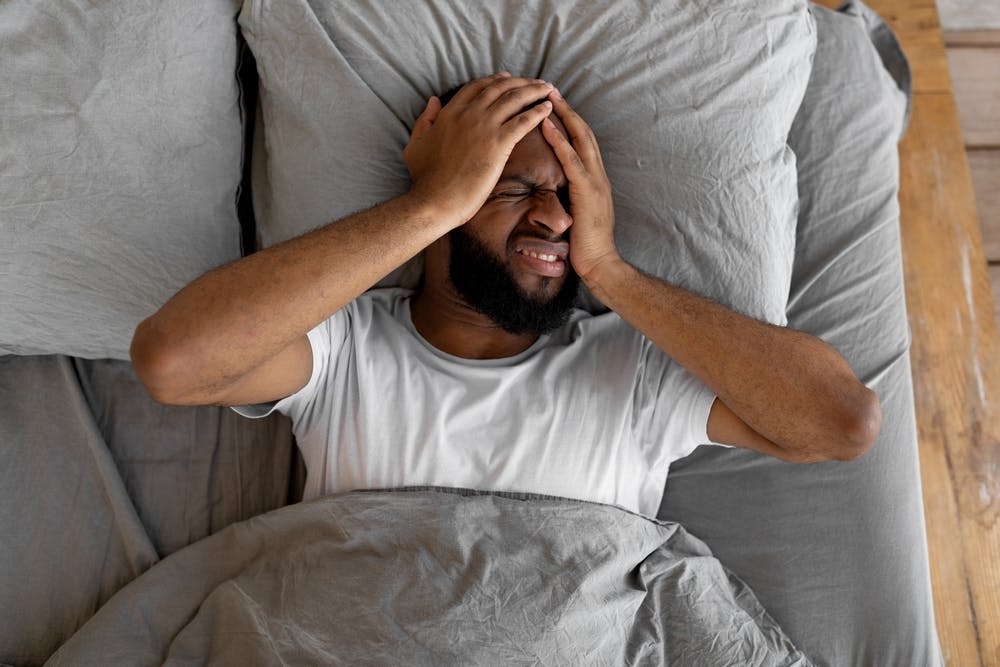While most people associate a hangover with physical discomfort, the psychological effects can’t be ignored. Hangover anxiety can be as debilitating as the physical symptoms, if not more. It’s not just about feeling a little low or out of sorts; it’s about experiencing intense worry, fear, and panic. It’s a feeling that can be tough to shake off, leaving you feeling unsteady and anxious for hours or even days.
You’ve maybe experienced the physical aftermath of a night of heavy drinking – the pounding headache, the nausea, the dry mouth. But for some, there’s another, less talked about symptom: hangover anxiety. It’s a feeling of dread, worry, or panic that can hit you the morning after drinking.
This is a real and legitimate issue, and it’s high time we began discussing it openly. Hangover anxiety is not just ‘feeling low’ after a night out, it’s a genuine condition that can take a severe toll on your mental health.
Below, we’ll look at hangover anxiety, helping you better understand this condition and what you can do about it.

What is Hangover Anxiety?
Hangover anxiety, also known as ‘hangxiety‘, describes feelings of anxiety or depression that occur after consuming alcohol. It’s not unusual to feel irritable, nervous, or anxious as the effects of alcohol wear off. But in some cases these feelings can be intense and last much longer than the physical hangover symptoms.
Alcoholaffects chemicals in your brain that control your mood and behavior. When you drink, these chemicals are disrupted, leading to feelings of relaxation and euphoria. But as the alcohol leaves your system, they can become out of balance and lead to feelings of anxiety.
Hangover anxiety can feel like a sense of impending doom, a fear of embarrassment, or a deep worry about something you can’t quite pinpoint. It’s an uncomfortable experience that can make you feel vulnerable.
What’s the Difference Between Hangover Anxiety and Regular Anxiety?
There are a few differences between hangover anxiety and general anxiety disorder (GAD).
Hangover anxiety is usually temporary and happens after drinking alcohol. It usually gets better within a few hours or days. It is directly related to drinking alcohol and can be avoided by reducing your alcohol intake or stopping altogether.
On the other hand, general anxiety disorder is a long-term mental health condition characterized by excessive, ongoing worry and fear. It’s not dependent on alcohol consumption, although alcohol can exacerbate it.
If you find yourself experiencing symptoms of anxiety frequently, even without drinking, you might have an anxiety disorder.
While hangover anxiety can be managed by reducing alcohol intake, general anxiety disorder often requires professional treatment, including therapy and medication.
Addressing Hangover Anxiety: Practical Solutions
If you’re dealing with hangover anxiety, there are several practical steps you can take to help manage your symptoms.
- Reduce your alcohol intake: It might seem obvious, but the less alcohol you drink, the less likely you are to experience hangover anxiety. Try setting limits for yourself and stick to them. Choose drinks with lower alcohol content and alternate between alcoholic and non-alcoholic beverages.
- Stay hydrated: Alcohol can make you urinate more, leading to dehydration. That can worsen anxiety. Drink plenty of water before, during, and after consuming alcohol to help prevent dehydration.
- Stay social: Hangover anxiety can make you want to withdraw from others, but that can make anxiety worse. Keeping a strong social network can help you feel better and reduce your anxiety symptoms.
- Seek help for Alcohol Use Disorder (AUD): If you are concerned about alcohol abuse in yourself or a loved one, reach out to a treatment network like Zinnia Health.
Professional Help for Hangover Anxiety
If your hangover anxiety is severe, persistent, or causing distress, it might be time to seek professional help. Mental health professionals can teach you the tools and strategies to manage your anxiety effectively.
Therapies like cognitive-behavioral therapy (CBT) can be particularly effective for managing hangover anxiety. CBT can help you identify and challenge unhelpful thoughts and behaviors, helping you to develop more constructive ways of thinking and reacting.
The Relationship Between Alcohol and Anxiety
The relationship between alcohol and anxiety is complex. While it may feel like alcohol reduces your anxiety, in the long run, it can make anxiety worse. It interferes with mood-regulating chemicals in your brain and can leave you feeling fatigued or even sick.
Drinking to cope with anxiety can create a vicious cycle. You might drink to feel less anxious, but as the effects of the alcohol wear off, your anxiety can return even stronger.
If you find that you’re regularly using alcohol to cope with feelings of anxiety, it might be time to seek professional help. There are healthier, more effective ways to manage anxiety that don’t involve alcohol.
Conclusion
Hangover anxiety is a real and valid condition that can cause significant distress. By understanding the causes and effects of hangover anxiety, you can take steps towards reducing your alcohol intake, staying hydrated, and seeking professional help if needed.
Author: Susan Egbert, PharmD. Susan is a registered pharmacist in Louisiana and graduate student at the University of Manitoba in the Department of Chemistry. She is interested in medicine, medical writing, plants, and learning languages.
Website: https://sites.google.com/view/lichenlady94/
LinkedIn: https://www.linkedin.com/in/susan-egbert-pharmd-8809899a/

